Business Student Work-Readiness: A Review of Recent Research Studies
VerifiedAdded on 2022/08/25
|5
|1480
|18
Report
AI Summary
This report provides a comprehensive review of five research articles focusing on the work readiness of business students. The articles explore various aspects, including the impact of non-technical skills, the effectiveness of business programs in preparing students for a global environment, the expectations and perceptions of management students regarding work readiness, the student perspective on employability, and the influence of language skills on future employment. Key findings highlight the importance of non-technical skills, the need for internationalized curricula, the gap between student expectations and reality, the alignment of student and employer perspectives, and the significance of communication skills. The studies emphasize the need for business schools to adapt their curricula to better equip students with the skills and knowledge required for success in the modern workplace. The report underscores the importance of experiential learning, the role of language skills, and the need to address skill gaps to improve graduate employability. The research suggests that a focus on practical skills, global perspectives, and student expectations is essential for preparing business students for the challenges of the professional world. The report concludes that business schools need to improve in providing the necessary skills to students.
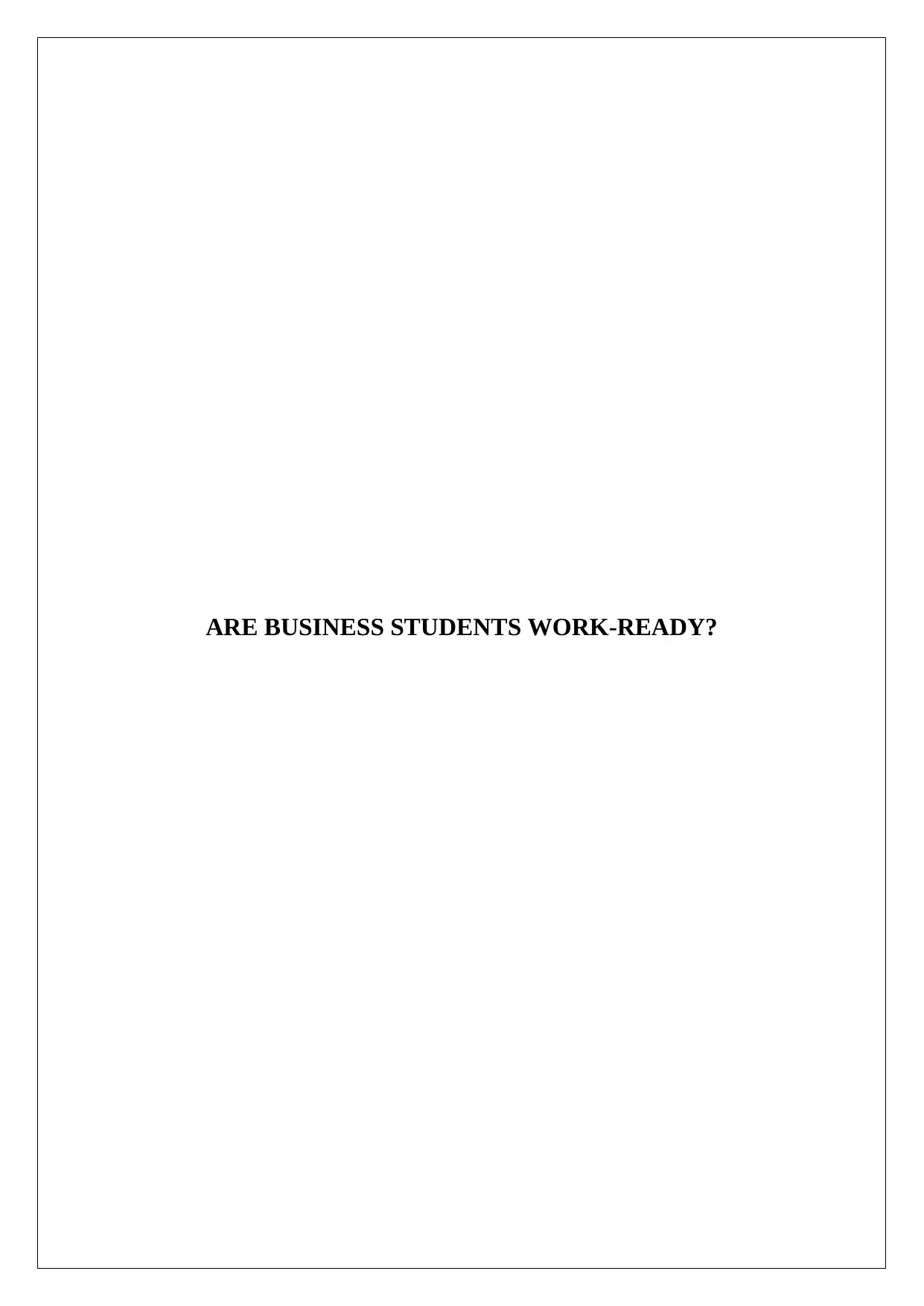
ARE BUSINESS STUDENTS WORK-READY?
Paraphrase This Document
Need a fresh take? Get an instant paraphrase of this document with our AI Paraphraser
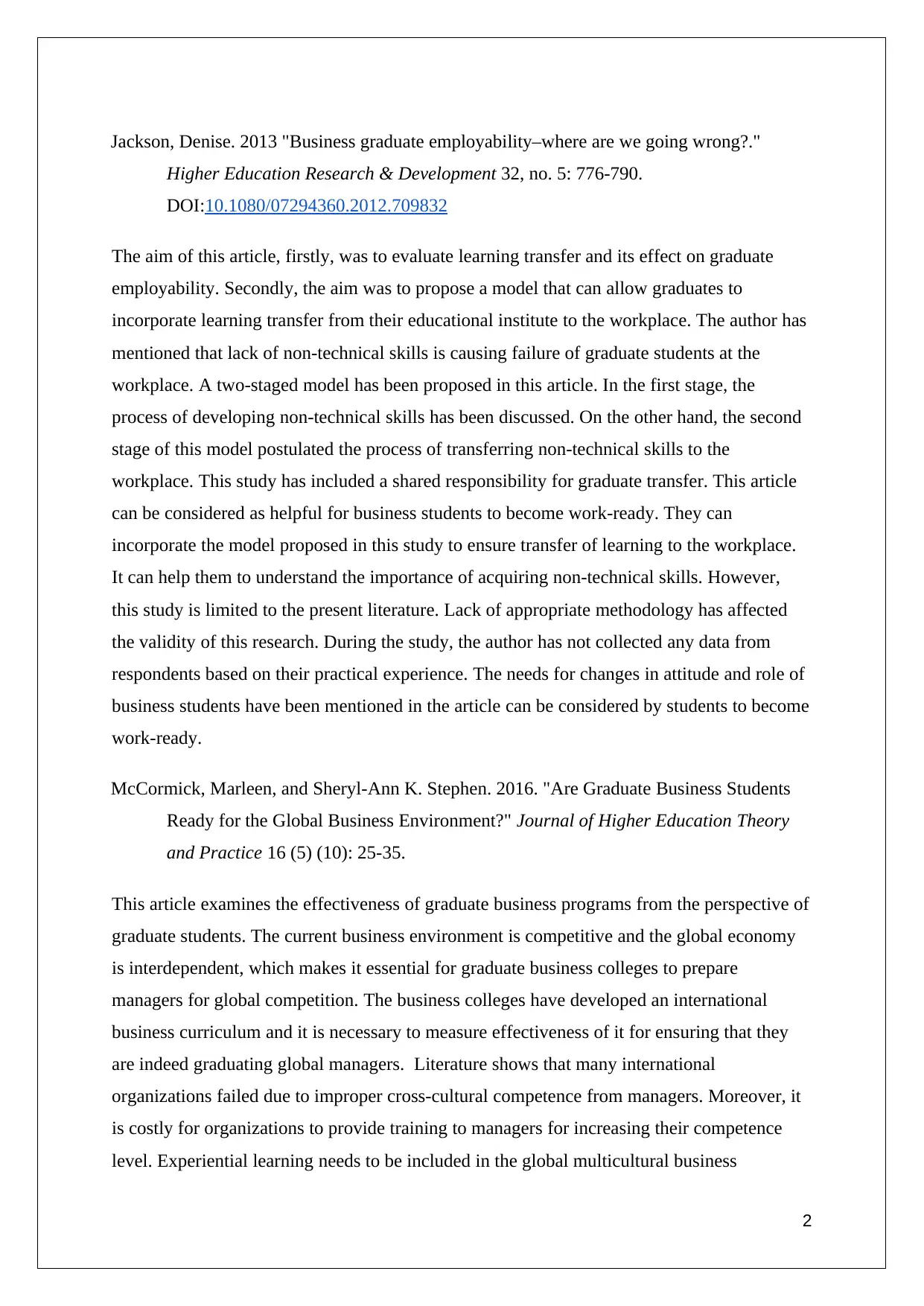
Jackson, Denise. 2013 "Business graduate employability–where are we going wrong?."
Higher Education Research & Development 32, no. 5: 776-790.
DOI:10.1080/07294360.2012.709832
The aim of this article, firstly, was to evaluate learning transfer and its effect on graduate
employability. Secondly, the aim was to propose a model that can allow graduates to
incorporate learning transfer from their educational institute to the workplace. The author has
mentioned that lack of non-technical skills is causing failure of graduate students at the
workplace. A two-staged model has been proposed in this article. In the first stage, the
process of developing non-technical skills has been discussed. On the other hand, the second
stage of this model postulated the process of transferring non-technical skills to the
workplace. This study has included a shared responsibility for graduate transfer. This article
can be considered as helpful for business students to become work-ready. They can
incorporate the model proposed in this study to ensure transfer of learning to the workplace.
It can help them to understand the importance of acquiring non-technical skills. However,
this study is limited to the present literature. Lack of appropriate methodology has affected
the validity of this research. During the study, the author has not collected any data from
respondents based on their practical experience. The needs for changes in attitude and role of
business students have been mentioned in the article can be considered by students to become
work-ready.
McCormick, Marleen, and Sheryl-Ann K. Stephen. 2016. "Are Graduate Business Students
Ready for the Global Business Environment?" Journal of Higher Education Theory
and Practice 16 (5) (10): 25-35.
This article examines the effectiveness of graduate business programs from the perspective of
graduate students. The current business environment is competitive and the global economy
is interdependent, which makes it essential for graduate business colleges to prepare
managers for global competition. The business colleges have developed an international
business curriculum and it is necessary to measure effectiveness of it for ensuring that they
are indeed graduating global managers. Literature shows that many international
organizations failed due to improper cross-cultural competence from managers. Moreover, it
is costly for organizations to provide training to managers for increasing their competence
level. Experiential learning needs to be included in the global multicultural business
2
Higher Education Research & Development 32, no. 5: 776-790.
DOI:10.1080/07294360.2012.709832
The aim of this article, firstly, was to evaluate learning transfer and its effect on graduate
employability. Secondly, the aim was to propose a model that can allow graduates to
incorporate learning transfer from their educational institute to the workplace. The author has
mentioned that lack of non-technical skills is causing failure of graduate students at the
workplace. A two-staged model has been proposed in this article. In the first stage, the
process of developing non-technical skills has been discussed. On the other hand, the second
stage of this model postulated the process of transferring non-technical skills to the
workplace. This study has included a shared responsibility for graduate transfer. This article
can be considered as helpful for business students to become work-ready. They can
incorporate the model proposed in this study to ensure transfer of learning to the workplace.
It can help them to understand the importance of acquiring non-technical skills. However,
this study is limited to the present literature. Lack of appropriate methodology has affected
the validity of this research. During the study, the author has not collected any data from
respondents based on their practical experience. The needs for changes in attitude and role of
business students have been mentioned in the article can be considered by students to become
work-ready.
McCormick, Marleen, and Sheryl-Ann K. Stephen. 2016. "Are Graduate Business Students
Ready for the Global Business Environment?" Journal of Higher Education Theory
and Practice 16 (5) (10): 25-35.
This article examines the effectiveness of graduate business programs from the perspective of
graduate students. The current business environment is competitive and the global economy
is interdependent, which makes it essential for graduate business colleges to prepare
managers for global competition. The business colleges have developed an international
business curriculum and it is necessary to measure effectiveness of it for ensuring that they
are indeed graduating global managers. Literature shows that many international
organizations failed due to improper cross-cultural competence from managers. Moreover, it
is costly for organizations to provide training to managers for increasing their competence
level. Experiential learning needs to be included in the global multicultural business
2
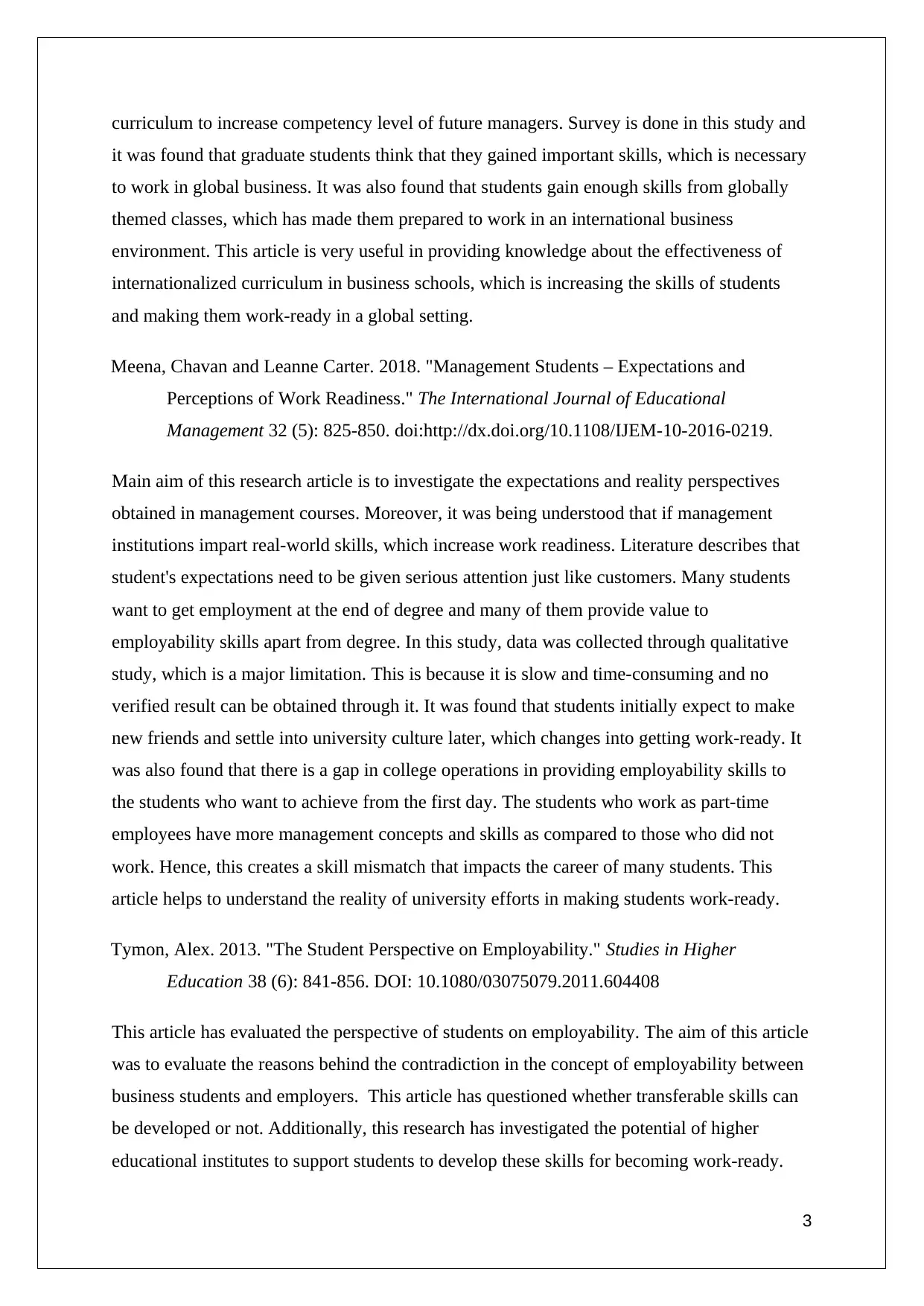
curriculum to increase competency level of future managers. Survey is done in this study and
it was found that graduate students think that they gained important skills, which is necessary
to work in global business. It was also found that students gain enough skills from globally
themed classes, which has made them prepared to work in an international business
environment. This article is very useful in providing knowledge about the effectiveness of
internationalized curriculum in business schools, which is increasing the skills of students
and making them work-ready in a global setting.
Meena, Chavan and Leanne Carter. 2018. "Management Students – Expectations and
Perceptions of Work Readiness." The International Journal of Educational
Management 32 (5): 825-850. doi:http://dx.doi.org/10.1108/IJEM-10-2016-0219.
Main aim of this research article is to investigate the expectations and reality perspectives
obtained in management courses. Moreover, it was being understood that if management
institutions impart real-world skills, which increase work readiness. Literature describes that
student's expectations need to be given serious attention just like customers. Many students
want to get employment at the end of degree and many of them provide value to
employability skills apart from degree. In this study, data was collected through qualitative
study, which is a major limitation. This is because it is slow and time-consuming and no
verified result can be obtained through it. It was found that students initially expect to make
new friends and settle into university culture later, which changes into getting work-ready. It
was also found that there is a gap in college operations in providing employability skills to
the students who want to achieve from the first day. The students who work as part-time
employees have more management concepts and skills as compared to those who did not
work. Hence, this creates a skill mismatch that impacts the career of many students. This
article helps to understand the reality of university efforts in making students work-ready.
Tymon, Alex. 2013. "The Student Perspective on Employability." Studies in Higher
Education 38 (6): 841-856. DOI: 10.1080/03075079.2011.604408
This article has evaluated the perspective of students on employability. The aim of this article
was to evaluate the reasons behind the contradiction in the concept of employability between
business students and employers. This article has questioned whether transferable skills can
be developed or not. Additionally, this research has investigated the potential of higher
educational institutes to support students to develop these skills for becoming work-ready.
3
it was found that graduate students think that they gained important skills, which is necessary
to work in global business. It was also found that students gain enough skills from globally
themed classes, which has made them prepared to work in an international business
environment. This article is very useful in providing knowledge about the effectiveness of
internationalized curriculum in business schools, which is increasing the skills of students
and making them work-ready in a global setting.
Meena, Chavan and Leanne Carter. 2018. "Management Students – Expectations and
Perceptions of Work Readiness." The International Journal of Educational
Management 32 (5): 825-850. doi:http://dx.doi.org/10.1108/IJEM-10-2016-0219.
Main aim of this research article is to investigate the expectations and reality perspectives
obtained in management courses. Moreover, it was being understood that if management
institutions impart real-world skills, which increase work readiness. Literature describes that
student's expectations need to be given serious attention just like customers. Many students
want to get employment at the end of degree and many of them provide value to
employability skills apart from degree. In this study, data was collected through qualitative
study, which is a major limitation. This is because it is slow and time-consuming and no
verified result can be obtained through it. It was found that students initially expect to make
new friends and settle into university culture later, which changes into getting work-ready. It
was also found that there is a gap in college operations in providing employability skills to
the students who want to achieve from the first day. The students who work as part-time
employees have more management concepts and skills as compared to those who did not
work. Hence, this creates a skill mismatch that impacts the career of many students. This
article helps to understand the reality of university efforts in making students work-ready.
Tymon, Alex. 2013. "The Student Perspective on Employability." Studies in Higher
Education 38 (6): 841-856. DOI: 10.1080/03075079.2011.604408
This article has evaluated the perspective of students on employability. The aim of this article
was to evaluate the reasons behind the contradiction in the concept of employability between
business students and employers. This article has questioned whether transferable skills can
be developed or not. Additionally, this research has investigated the potential of higher
educational institutes to support students to develop these skills for becoming work-ready.
3
⊘ This is a preview!⊘
Do you want full access?
Subscribe today to unlock all pages.

Trusted by 1+ million students worldwide
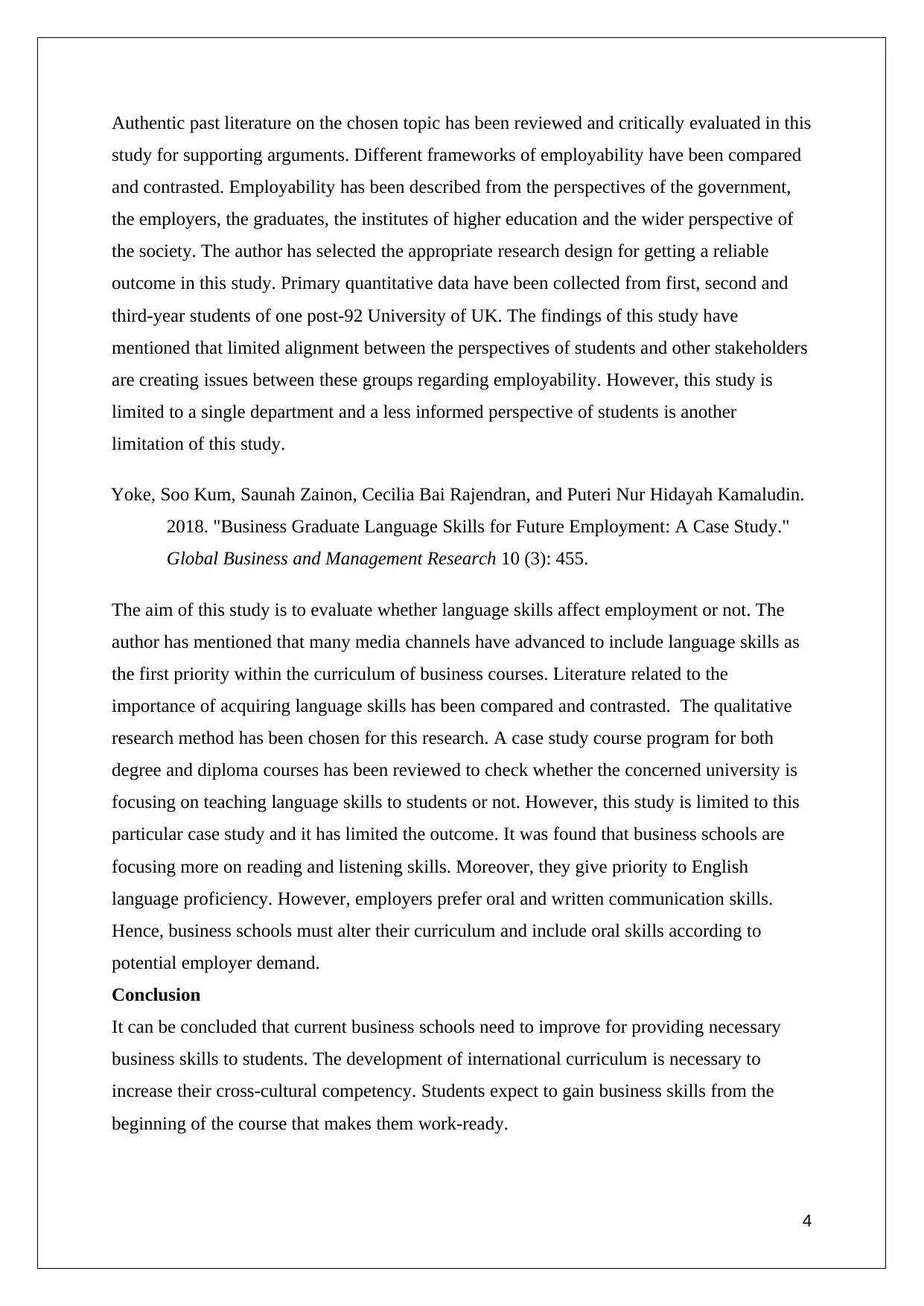
Authentic past literature on the chosen topic has been reviewed and critically evaluated in this
study for supporting arguments. Different frameworks of employability have been compared
and contrasted. Employability has been described from the perspectives of the government,
the employers, the graduates, the institutes of higher education and the wider perspective of
the society. The author has selected the appropriate research design for getting a reliable
outcome in this study. Primary quantitative data have been collected from first, second and
third-year students of one post-92 University of UK. The findings of this study have
mentioned that limited alignment between the perspectives of students and other stakeholders
are creating issues between these groups regarding employability. However, this study is
limited to a single department and a less informed perspective of students is another
limitation of this study.
Yoke, Soo Kum, Saunah Zainon, Cecilia Bai Rajendran, and Puteri Nur Hidayah Kamaludin.
2018. "Business Graduate Language Skills for Future Employment: A Case Study."
Global Business and Management Research 10 (3): 455.
The aim of this study is to evaluate whether language skills affect employment or not. The
author has mentioned that many media channels have advanced to include language skills as
the first priority within the curriculum of business courses. Literature related to the
importance of acquiring language skills has been compared and contrasted. The qualitative
research method has been chosen for this research. A case study course program for both
degree and diploma courses has been reviewed to check whether the concerned university is
focusing on teaching language skills to students or not. However, this study is limited to this
particular case study and it has limited the outcome. It was found that business schools are
focusing more on reading and listening skills. Moreover, they give priority to English
language proficiency. However, employers prefer oral and written communication skills.
Hence, business schools must alter their curriculum and include oral skills according to
potential employer demand.
Conclusion
It can be concluded that current business schools need to improve for providing necessary
business skills to students. The development of international curriculum is necessary to
increase their cross-cultural competency. Students expect to gain business skills from the
beginning of the course that makes them work-ready.
4
study for supporting arguments. Different frameworks of employability have been compared
and contrasted. Employability has been described from the perspectives of the government,
the employers, the graduates, the institutes of higher education and the wider perspective of
the society. The author has selected the appropriate research design for getting a reliable
outcome in this study. Primary quantitative data have been collected from first, second and
third-year students of one post-92 University of UK. The findings of this study have
mentioned that limited alignment between the perspectives of students and other stakeholders
are creating issues between these groups regarding employability. However, this study is
limited to a single department and a less informed perspective of students is another
limitation of this study.
Yoke, Soo Kum, Saunah Zainon, Cecilia Bai Rajendran, and Puteri Nur Hidayah Kamaludin.
2018. "Business Graduate Language Skills for Future Employment: A Case Study."
Global Business and Management Research 10 (3): 455.
The aim of this study is to evaluate whether language skills affect employment or not. The
author has mentioned that many media channels have advanced to include language skills as
the first priority within the curriculum of business courses. Literature related to the
importance of acquiring language skills has been compared and contrasted. The qualitative
research method has been chosen for this research. A case study course program for both
degree and diploma courses has been reviewed to check whether the concerned university is
focusing on teaching language skills to students or not. However, this study is limited to this
particular case study and it has limited the outcome. It was found that business schools are
focusing more on reading and listening skills. Moreover, they give priority to English
language proficiency. However, employers prefer oral and written communication skills.
Hence, business schools must alter their curriculum and include oral skills according to
potential employer demand.
Conclusion
It can be concluded that current business schools need to improve for providing necessary
business skills to students. The development of international curriculum is necessary to
increase their cross-cultural competency. Students expect to gain business skills from the
beginning of the course that makes them work-ready.
4
Paraphrase This Document
Need a fresh take? Get an instant paraphrase of this document with our AI Paraphraser
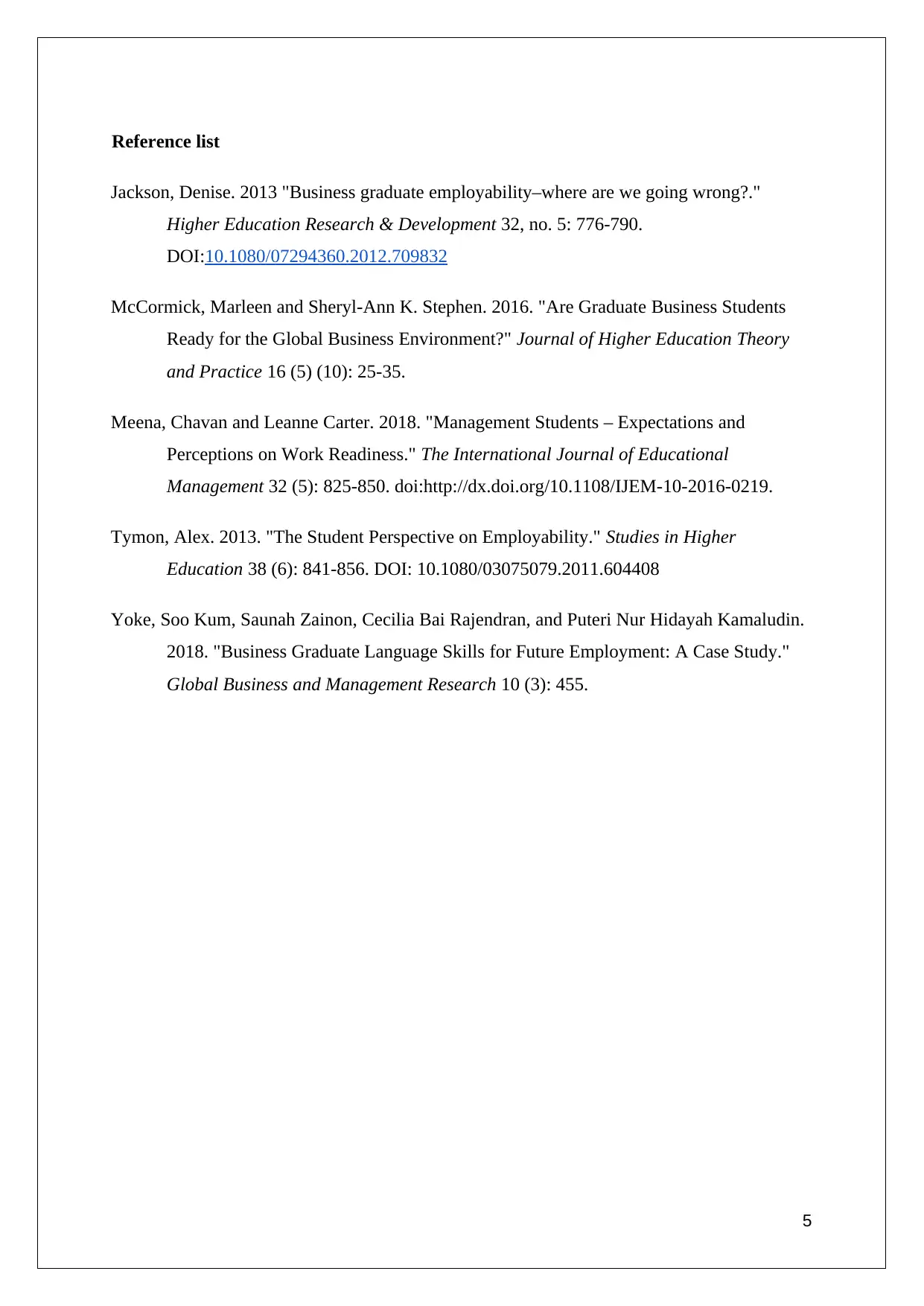
Reference list
Jackson, Denise. 2013 "Business graduate employability–where are we going wrong?."
Higher Education Research & Development 32, no. 5: 776-790.
DOI:10.1080/07294360.2012.709832
McCormick, Marleen and Sheryl-Ann K. Stephen. 2016. "Are Graduate Business Students
Ready for the Global Business Environment?" Journal of Higher Education Theory
and Practice 16 (5) (10): 25-35.
Meena, Chavan and Leanne Carter. 2018. "Management Students – Expectations and
Perceptions on Work Readiness." The International Journal of Educational
Management 32 (5): 825-850. doi:http://dx.doi.org/10.1108/IJEM-10-2016-0219.
Tymon, Alex. 2013. "The Student Perspective on Employability." Studies in Higher
Education 38 (6): 841-856. DOI: 10.1080/03075079.2011.604408
Yoke, Soo Kum, Saunah Zainon, Cecilia Bai Rajendran, and Puteri Nur Hidayah Kamaludin.
2018. "Business Graduate Language Skills for Future Employment: A Case Study."
Global Business and Management Research 10 (3): 455.
5
Jackson, Denise. 2013 "Business graduate employability–where are we going wrong?."
Higher Education Research & Development 32, no. 5: 776-790.
DOI:10.1080/07294360.2012.709832
McCormick, Marleen and Sheryl-Ann K. Stephen. 2016. "Are Graduate Business Students
Ready for the Global Business Environment?" Journal of Higher Education Theory
and Practice 16 (5) (10): 25-35.
Meena, Chavan and Leanne Carter. 2018. "Management Students – Expectations and
Perceptions on Work Readiness." The International Journal of Educational
Management 32 (5): 825-850. doi:http://dx.doi.org/10.1108/IJEM-10-2016-0219.
Tymon, Alex. 2013. "The Student Perspective on Employability." Studies in Higher
Education 38 (6): 841-856. DOI: 10.1080/03075079.2011.604408
Yoke, Soo Kum, Saunah Zainon, Cecilia Bai Rajendran, and Puteri Nur Hidayah Kamaludin.
2018. "Business Graduate Language Skills for Future Employment: A Case Study."
Global Business and Management Research 10 (3): 455.
5
1 out of 5
Related Documents
Your All-in-One AI-Powered Toolkit for Academic Success.
+13062052269
info@desklib.com
Available 24*7 on WhatsApp / Email
![[object Object]](/_next/static/media/star-bottom.7253800d.svg)
Unlock your academic potential
Copyright © 2020–2026 A2Z Services. All Rights Reserved. Developed and managed by ZUCOL.





